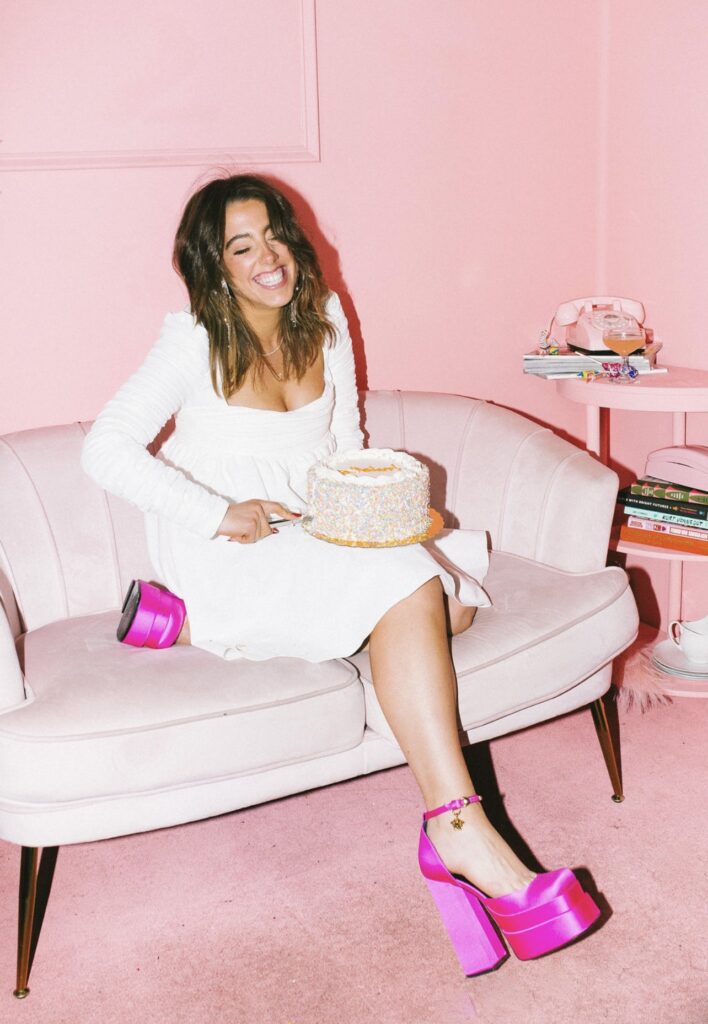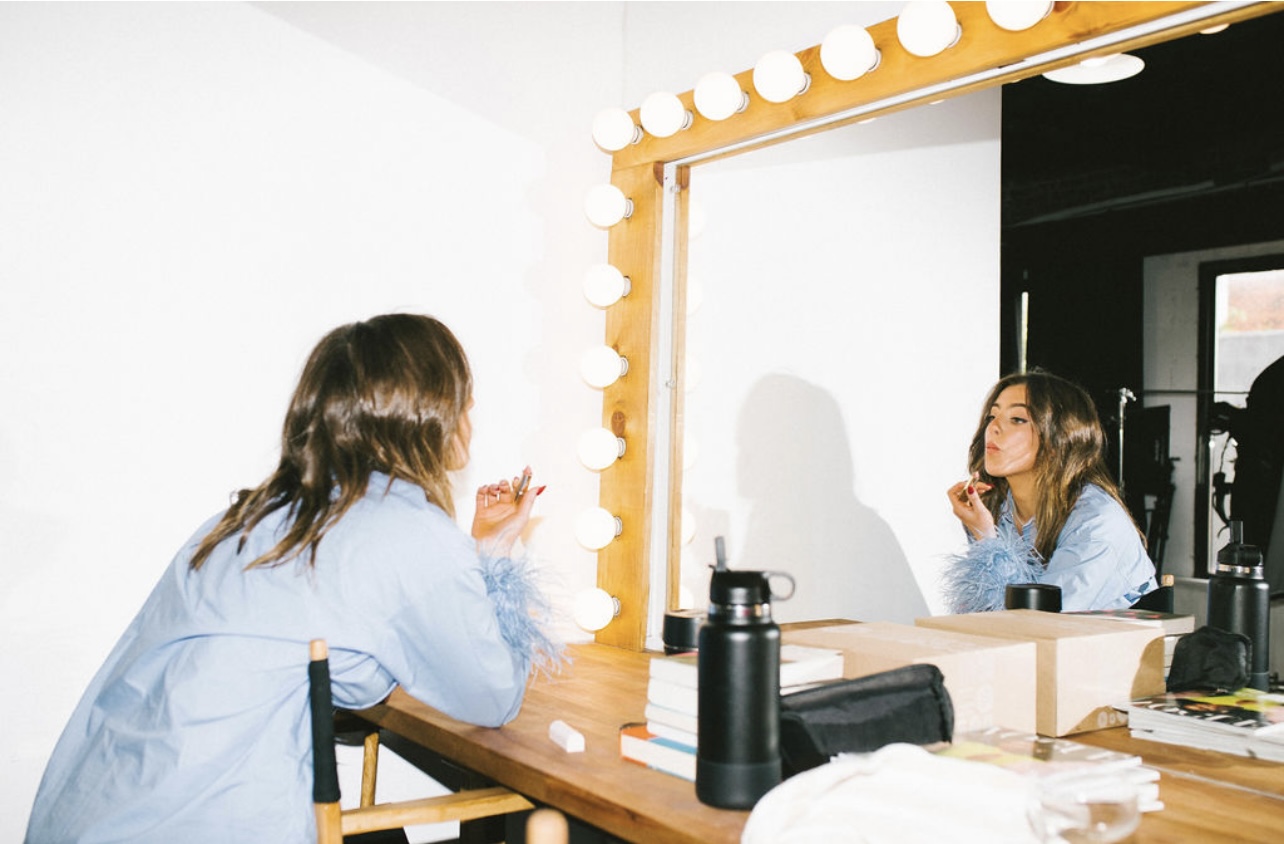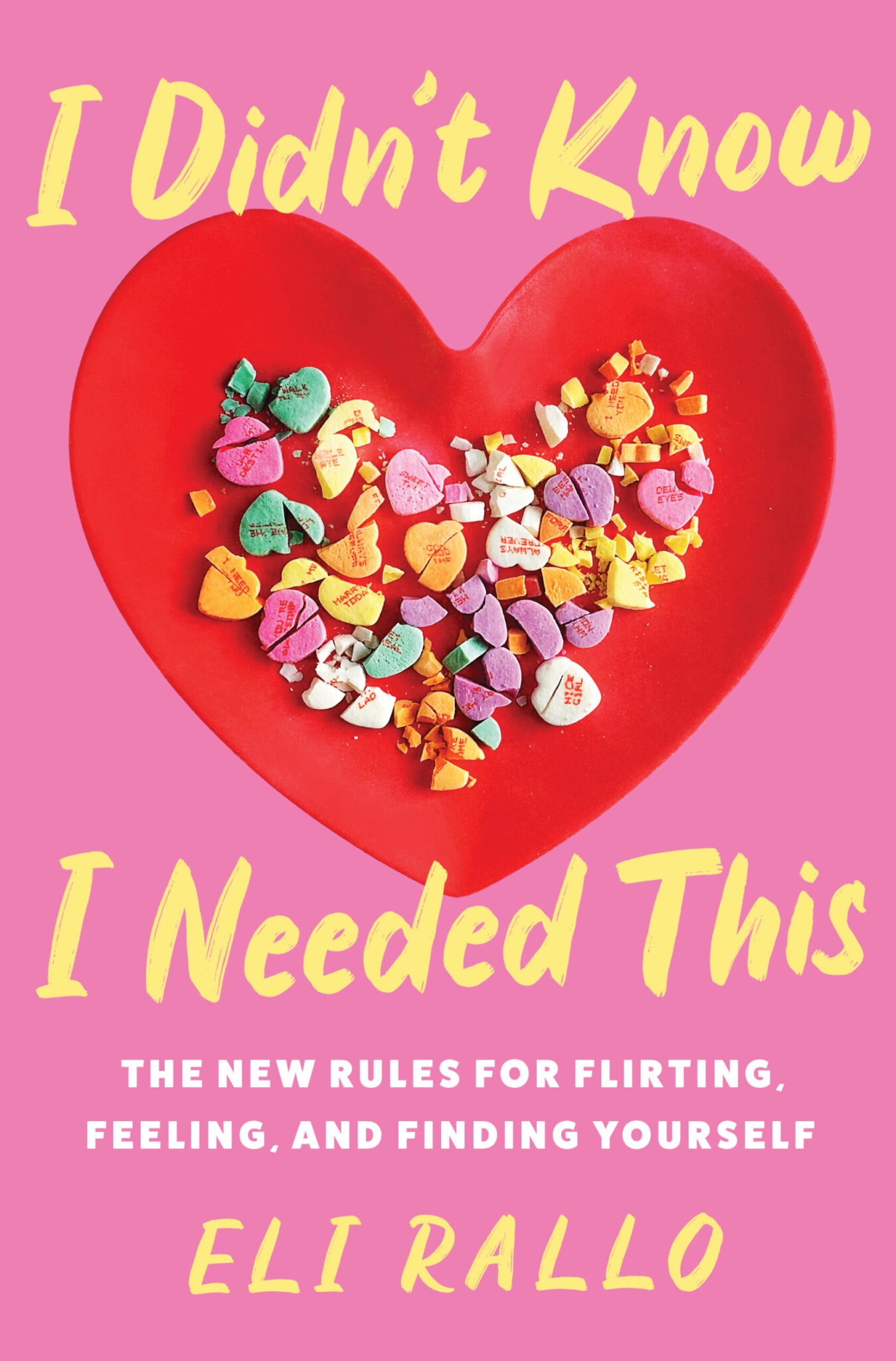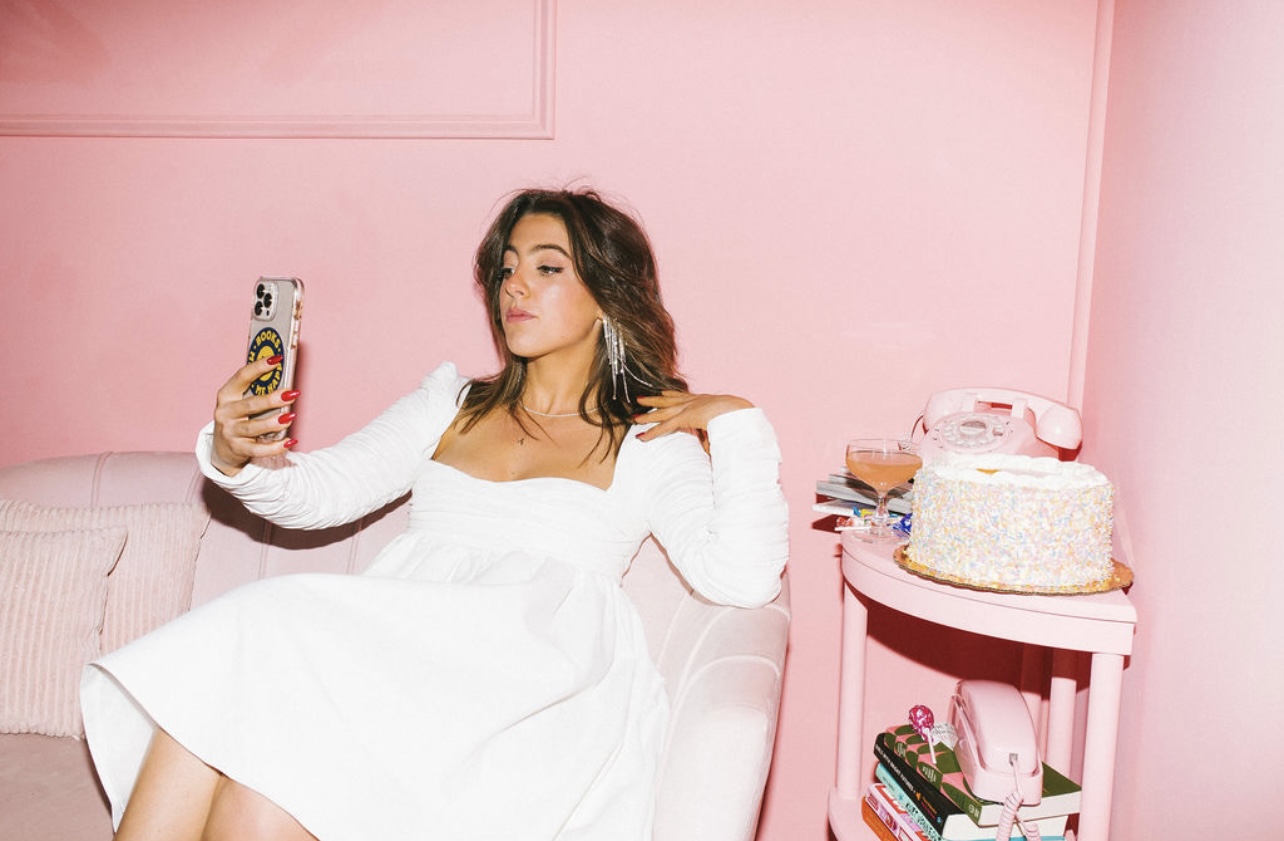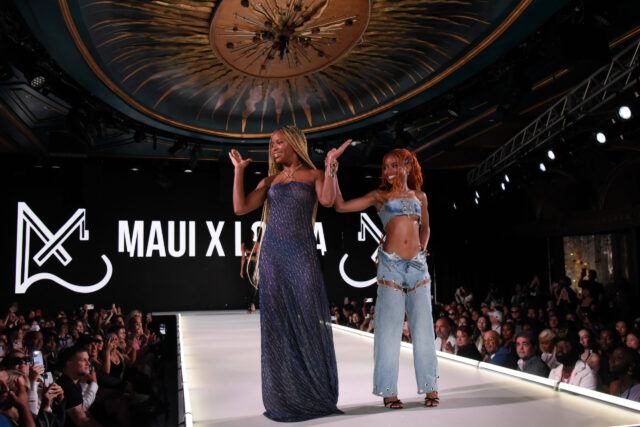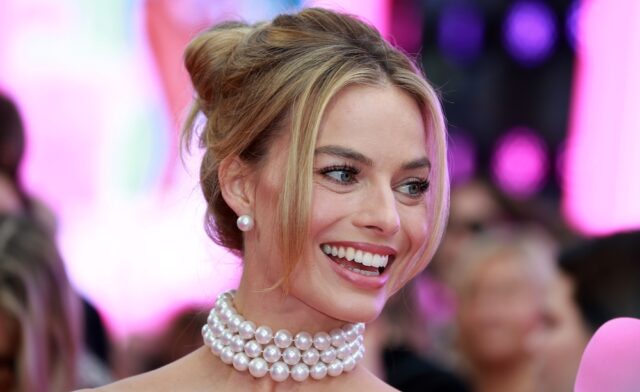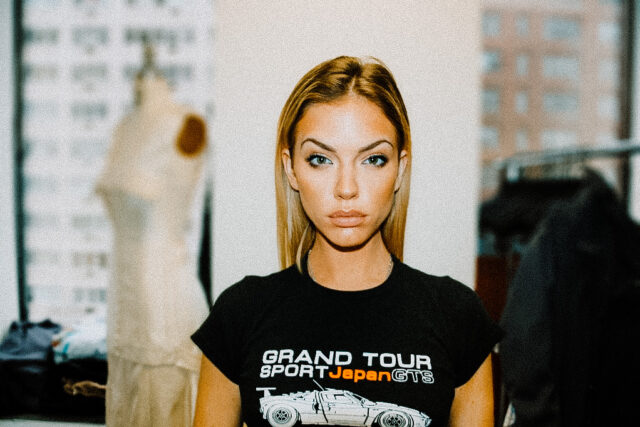INTERVIEW: Eli Rallo Talks Loving Yourself, Partner, and Friends in New Book I Didn’t Know I Needed This
If you’re a TikTok user (who isn’t?), chances are an Eli Rallo video has popped up on your “For You Page,” with some wisdom needed to get you out of your rut.
Whether she had told you that “You’re not a ‘maybe.’ You’re not a ‘not right now but maybe one day. You’re worth fighting for” to the tune of Taylor Swift’s “Mine;” or she’s giving you her rules for sneaky links, getting ghosted by your ex, or flirting Rallo is the modern day Carrie Bradshaw.
Now, Rallo is taking her advice to the big leagues with her debut book, I Didn’t Know I Needed This: The New Rules for Flirting, Feeling, and Finding Yourself. Throughout the book, Rallo dives deep into her past relationships with herself, friends, and partners to talk about the good, the bad, the ugly, and everything in between. Making you, the reader, feel like you’re not alone in this game we call life.
Ahead of the book’s release, we talked with Rallo about her inspiration behind the book, why our favorite TV couples aren’t the best guides, and, of course, we had to tell her, “We didn’t know we needed this.”
Check out the full interview below.
BRITTANY: Eli, thank you so much for speaking with Glitter today.
ELI: Thank you for having me. I’m so excited.
BRITTANY: Congratulations on your book, I Didn’t Know I Needed This. We have it right here, and you can see I marked it up. I haven’t marked up a book like this since high school. Let me tell you, some of them were questions that I wanted to ask, but also some I wanted to remember things, like, “I want to remember this. I want to go back and look at this.” So, in this book, there is just so much information and attention to detail, right? Everything from your rules to your tips and even the cover I saw you went through like a cake design, an animated silhouette, and even another version of the candy hearts. So first, tell me about the cover. When you saw this, what made you think that’s the cover of the book?
ELI: Yeah. So it’s actually kind of an interesting story because it’s less so that it was presented to me and more so that I went out looking for it. I was just in a meeting with my agents. If you’re not familiar with the publishing industry, the sort of role of an agent after they like, advocate for you and help you to sell your book is sort of like acting as a liaison between you and the publisher, you and your editor, and things like the cover will be a conversation that always includes your agent. The decision is obviously yours at the end of the day as the author, but you’re consulting them constantly, especially if you have a good relationship with them. So that was something that was happening throughout the process as we saw different covers, and we were seeing covers that had just one candy heart that was broken, and it was actually the same colorways of the same pink, the same yellow, and the same fonts, but it just didn’t feel right. Something felt off. So my agents and I were side barring the three of us, and having a conversation about it, and we were like, “It isn’t really about being brokenhearted. It’s moreso about you can have a broken heart, but you can’t ever really lose yourself like you, and your choice is all you really have. Your ability to heal is all you really have.” So it didn’t really make full sense to have that cover be a broken heart. So one of my agents was like, “What if we could find an image that was like a bunch of broken candy hearts in the shape of a heart?” So we started searching for clip art, and you can license and purchase clipart. It’s like a whole thing with copyright and whatnot. So we found the image that’s on the cover. We really liked it. We asked HarperCollins if they could check if they could buy it and if they could replace the image on the cover we liked with that image instead. And so they did that and sent it back. And that’s when it was really like, “Oh, wow, this is the cover.” So it was definitely quite the process. But I’m really grateful for said process because it wound up being exactly what we needed and what I needed at the end of the day.
BRITTANY: Again, the attention to detail. I know they always say don’t judge a book by its cover, but if I saw this book in a store, I would gravitate towards it. I think it’s adorable. It’s so pretty. And yeah, it really, like you said, it’s not necessarily about being brokenhearted, but about, you know, finding those pieces and putting those pieces together. So I think that’s really cool how you symbolize that in this cover.
ELI: Thank you.
BRITTANY: So, let’s talk about your experience of taking your three-minute TikTok videos. Right? This is where we know you from from social media. Your podcast Miss Congeniality, your lists on TikTok. So what was the experience of taking your three-minute videos to a 300-page book?
ELI: It’s really interesting because, obviously, most people know me because of the internet, right? Like, nobody who knows who I am knows who I am from anything other than the internet. And if it is the podcast, that’s probably likely by way of the internet as well. That is something I’m so grateful for. You know, that’s like an irreplaceable connection, something that I am consistently recognizing as lucky. Like, that’s so lucky that people know me from the internet. I think a lot of people like clock me in their brain as like a content creator and TikToker or somebody who makes internet content. That’s fair because that’s obviously how they know me. I’ve always clocked myself as a writer and a creative, and I’m certain that’s just because that’s always been my passion project. Like long before, I was online in the way that I am now. And it was always sort of the driving force and the pulse. I always knew that I was going to be a creative in some kind of way and that I would go on to be a writer. In my brain, I clocked myself as a writer. So I think, in many ways sitting down to write this book was definitely more challenging than sitting down to create a three-minute TikTok video. It was also much more comfortable than sitting down to create a three-minute TikTok video. TikTok has become something that is so a part of my wheelhouse and so comfortable to me. But it didn’t start that way. Of course, there was a learning curve, and that wasn’t something that I was super familiar with, and none of us were because the app didn’t exist. So I would say that while it might seem kind of wild, I took three-minute TikTok videos and turned them into a 300-page book. For me, what’s really more wild is creating video content on the Internet. That’s something that feels so new and interesting and different, and writing a book is something that I feel like was always inside of me and I was always ready for. So I feel very grateful that one led to the next. But I think the shock that a lot of people have when they’re like, you wrote a book, is the shock that I bring like, “You create TikToks online?” Like, that’s so cool. That’s so wild. That’s so interesting. So I think that because writing is so inherent to me. It definitely was challenging, but it was also just like the most comfortable and also like guttural thing. It was just an instinct. I’m very, very grateful that I get to say that my job feels that way to me.
BRITTANY: It’s so funny because I was going to ask you that, given you were a writer way before the book, you talk about, you know, being at some publications while you were in college and even getting your masters in journalism. So did you, in a way, find it a little harder to sit down and write this book? It’s like, “Hey, I’m a writer, and I have to make sure, like, this is perfect.” Or was it like, “You know what? This comes naturally to me.”
ELI: I think it’s a bit of both. I honestly think of anything, you know, being a debut author. Like, you don’t know what any of those milestones are, finishing your first book, having your first book come out, having a public reception of your first book, you don’t know what any of that is going to feel like. Of course, you could compare and contrast it to experiences that you had prior to doing a book, but you don’t really know what that’s going to feel like. I think, in a way, I know what it feels like to put something out into the world that I made because I do it on a daily basis and have people start conversations around it. The good, the bad, the brilliant, the beautiful, the ugly, whatever they want to say about it is live in the comment section for me to digest. So I think that in so many ways, all of those parts about the creation of a book and the anticipation of it coming out feels a lot easier as a debut author because I’m so used to interacting with the public and people consuming something that I made. Obviously, this is much different because it’s longer. It was more of a labor of love than a three-minute video. It’s maybe more intimate and less superfluous than TikTok. But at the end of the day, I think the challenges were more so in the concept that people are going to consume something. That’s so, you know, important to me and so like integral to who I am and less so like the daunting task of writing a book, if that makes sense.
BRITTANY: Moving on to the content of the book. In the preface, you describe yourself as the “older sister sitting on our bed handing us tequila and tissues,” which did feel like that while reading the book. Sometimes as young women, right, we go through bad dates, bad relationships, and we’re like, you know what? I’m just going to take this to my grave. I’m not going to tell anybody, maybe a friend or two. So what kind of inspired you to maybe step up in a way that’s like, “You know what? I’m going to write this book and show these young women like, we’re not alone in in this dating game?”
ELI: I think for so long when I was dating, but also just like in my day-to-day life, a lot of the battles that I was facing or issues that I was struggling with or insecurities that I was dealing with or questions that I had about things I was burying all of that for exactly what you just said. Like, “I’m going to take this to the grave. This is embarrassing. Other people aren’t going through this. I don’t need to talk about this out loud. Nobody’s going to relate to this.” And then slowly, I started to seek out different women writers, creators, podcasters, even actors, you know, people that work in justice reform and social justice work, women that were willing to talk about things that are maybe seen in society as uncomfortable or something that we shouldn’t be talking about or silly or stupid or any of those things. And I noticed how much it comforted me for someone to share an experience they went through and how it felt like it was them basically being like, you are not alone in this. And, like, we can talk about those things. And I recognized sort of the power of. Sharing really, and sharing our lived experience. And, of course, nobody is obligated to share their lived experience. Nobody is obligated to talk about what they’re going through. But I think when we do find it in ourselves to share those things, we do a massive service to other people who might be going through the same thing. And we just break down that awkward wall, that standing in between us and talking about that thing, and it becomes more normal. The only way we can really normalize anything is by putting it out there. So, I think when I was writing, that was sort of my thought process was like, well, once you break through that wall and you get to the other side of it, you realize, like, how much talking about something with people can actually, like, help you to heal and help other people to feel seen, which I love.
BRITTANY: I Didn’t Know I Needed This is broken up into three parts, and the majority of relationships discussed are with your significant others, with your friends, and with yourself. So can you tell me what was maybe one of the easier parts to write and maybe some of the harder parts to write about?
ELI: Yeah. It’s interesting. I’m very healed from a lot of the stuff that I write about in the book. It feels like even though some of those things happened like four years ago, five years ago, I feel like I’ve completely departed from that place and I’ve really like one added from where I was then. I think that the difficult part of writing about breakups and trauma and emotional distress that I was going through four or five years ago wasn’t that I was sad about that person or that situation or that experience, but I, more so, was grieving that version of myself. I think mostly was looking at that version of myself from a slightly older, slightly wiser, slightly more emotionally put together version of myself where I just, like, want to give that person a hug and comfort her and just tell her, “It’s going to be okay and we’re going to figure it out because we did.” So, I think that the difficulties of certain chapters came from that sort of a place and not a place of like, “Oh, I miss my ex,” because I definitely don’t. It was more so; “oh, I wish that I could be there for that version of myself.” And then I would say the easiest people to write about are my girlfriends, without a shadow of any doubt. I got a lot of feedback that the best parts of the book are the parts where I write about my girlfriends. I think that going into my career as a writer in the future. I’ll always be talking about dating. That’s partially my wheelhouse, and it inspires me. It’s something that I love. I love talking about romantic relationships thinking about them, and theorizing about them. But I think going into the future, I really do want to write more about female friendships and those relationships and how they’ve impacted me. So I think that was probably the easiest part if I had to choose was writing about my friends because, I mean, they really write themselves.
BRITTANY: They do. And I also had a lot of fun reading about your friend. You know, you talk about how you can be in this friend group but also strengthen your individual friendships with one another. You talk about the weekly dinners you guys have, and I think that’s so important because, as you mentioned, you feel like once you graduate college, it’s like, “Oh no, like my time is up. Like the friends I have now are the friends I’m I have for life,” because you feel like you ran out of time. So I think it is really important to hone in on those friendships and harvest those friendships. And when discussing friendships, you know, we hear a lot about Sadie. You also acknowledge Ali in your acknowledgments section. So when it came time to write the book, tell me what was their reaction when you told them, “Hey, I’m writing a book,” what has their support been like through this process?
ELI: That’s a good question. I’m very lucky that I have some very, very close female friends in my life, and I think I wrote about this in the last chapter. I was never somebody you would look at and say, “Oh, she’s insecure,” because I was really good at putting up a front. I was pretty deeply insecure early in college, and I don’t think that I really freed myself from all of those insecurities until I graduated and living in New York. I think the first real step was I realized I was sort of like pretending to be somebody I wasn’t. In my sophomore year of college, I remember thinking to myself, like, what would happen if I just decided to embrace who I am and be fully, truly myself? I realized that, like, I would probably lose some people who didn’t want to be around the true version of me or didn’t like the true version of me. But that’s fine. Why would I want to be around people who didn’t want to be around me at 100% and the people who loved me? Our relationships would likely strengthen. Strengthen because I was stepping into this full true version of myself and in being completely authentic or in trying to surrender those insecurities, my personal relationships with my friends who I love, who love me, would flourish. I think when I write about those people, it’s very special because they’ve been around for pretty much all of it. You know, I don’t touch on some friends who are newer in the book for sure, and we know we love our new friends as well, but they’ve been really like here for a really long time. And I think that their reaction was not at all surprised, but really excited. I think that they would all say that I’m like the same person that I’ve always been, but I’m just like doing what I was always meant to do now. It’s really a beautiful thing to get to say that you have a support system in female friends that is as strong as mine. I don’t take it for granted, I’m constantly working to be the friend that they’ve been to me, and I hope that I do that on an everyday basis. But it’s really special that I get to share in this moment with them because, you know, they are such a massive part of my life and my story. And Sadie specifically, who’s Ali, and I think that’s relatively obvious is a really big throughline of the book. So it’s really special that she got to be a part of this whole thing. And she’s read the book that a few of my friends have read it cover to cover it, which is amazing that they got to read it early. So I feel very lucky.
BRITTANY: That’s so sweet. As you mentioned, it is so important to have that support system. But something else I want to bring up, which you kind of mentioned earlier in the question, was the sense of individuality and how until you really found yourself, you know, you kind of had this front, and you discuss a relationship that went south because you didn’t necessarily have an identity outside of the relationship. Everything was like his hobbies, his friends, that whole kind of thing. Establishing individuality is really a theme that we see throughout the book. So, what do you say to somebody who is in a place that it’s like, “Wow, I don’t know who I am without this particular thing that I’m fixated on, but I want to start finding, But I don’t know where to start?”
ELI: You know, I think that there is a false piece of advice we get so often, which is you cannot be in a romantic relationship and also on a journey to self-discovery. That’s a complete falsehood. You can you should always be on a journey to self-discovery. And by saying, “I cannot be in a romantic relationship until I 100% know who I am.” You’ll never be in a romantic relationship because we’re never going to be 100% sure of who we are. But I think it’s really important that you are actively on that journey of self-discovery. If you’ve lost your spark or your sparkle, or you don’t know yourself, or you’re hiding a certain part of yourself, or you don’t want to get to know yourself. I think it’s really important that if you are in a romantic relationship and you do feel like you’ve lost yourself, to really be actively finding yourself for you. I think the mistake that I made that I wrote about in the book is that I sort of took comfort in the fact that my identity was being in this relationship because it sort of distracted me from the reality that, eventually, I would have to get to know myself. Either he was going to end the relationship because nobody wants to date someone who just like, relies on the relationship for their identity, which is what happened. Or, on the other hand, I was just going to eventually like have a massive breakdown right when I didn’t have like any of my own hobbies or interests or passions or I wasn’t watering those things. So I think it’s, first of all, just remembering all the ways that you can be on a journey of self-discovery and simultaneously be in a relationship. But secondarily, remember that caring for yourself and putting yourself first, like your number zero priority, turns out to be community care, meaning it turns out to benefit the people in your life. If you are taking care of yourself, if you are discovering new things about yourself, if you’re watering your interests and your passions and your hobbies, and if you have your own groups of friends and your own goals that you’re setting independent of your romantic relationship, well, you’re going to be the best version of you. When you’re the best version of yourself, then you can be the best version of you for everybody. You can take care of your romantic partner and your friends and your family members in a way that you would not necessarily be able to. Had you not sort of been focusing on yourself in that way. I always say you have to be intentionally selfish and selfishly intentional. There’s a bunch of different kinds of selfishness, you know, there’s like complete and total selfishness where you have zero regard for other people. But then there’s also a way to be selfish where you do have regard for other people, but you’re just prioritizing you. And I think that sometimes we villainize that in pop culture and media, but it really should be normalized that we should take care of ourselves at number zero and put ourselves first. So I think that that’s really what I discovered through that relationship. And at the end of the day, I’m so glad that that relationship ended for a variety of reasons that you can read more about in the book. It was a rude awakening and it was kind of embarrassing to have that realization and then also to ignore it for so long. But I’m glad that I went through that because being on the other side now, I can recognize, you know, what not to do in the future if I ever come to that point again.
BRITTANY: You know, I think that was such an important topic to speak about in the book. I think as young women, when we kind of had that dating pool, it’s like you almost fixate on another person because this is a world that’s so new to you that you don’t know how to navigate. And speaking of that, you also mentioned something that I remember. I bookmarked it, and I’m like, “Wow, this really has me thinking,” At one point, well, you knew about relationships that came from Blair Waldorf and Chuck Bass, just dating Nick Miller. And it really had me thinking because I remember when it was kind of my time as well, I thought, you know, Chuck and Blair, Troy and Gabriella. So as young women, a lot of times, what we see or what we expect going into that dating pool is what we see portrayed in the media. And it’s not necessarily reality. So what would be, you know, maybe your number one piece of advice to teenagers or young women who are about to hit that?
ELI: Speaker 2: [00:20:54] You know, I think that it’s interesting because, like, we think about like Chuck and Blair which is like arguably and objectively like it was, everybody’s like, goal. That is one of, if not the most toxic and manipulative portrayals of romantic love for adolescent people that exists in the media, as is Ross and Rachel, as is just Nick. So many realistic depictions of relationships, but the push and pull and the mental manipulation and the emotional manipulation and the toxicity and the on again-off again and the like, using physical intimacy as leverage and power and all this stuff. It’s just like genuinely not a good representation of a healthy relationship. I think, like with like anything, how can you learn to do anything without a positive representation of what that would look like? Like, I’m not just going to say like, “Oh, go learn how to do quantum physics.” You’re like, “Well, I need examples. I need like a textbook and lessons and someone to teach me and mentor me on how to do this. I can’t just, like, learn quantum physics.” It’s really similar in romantic relationships. Like, I don’t understand how we’re just expected to, like, know how to do it. And then, when we’re looking up to these media portrayals of romantic relationships that are so toxic because if they weren’t toxic, it wouldn’t be entertaining. We end up sort of pigeonholing ourselves, or for lack of a better phrase, running into a lot of problems in our relationships because that’s what we’re aspiring to, you know? I think it’s easier said than done than to, say, find, you know find romantic relationship inspo or find mentors, but be searching in your life for people that are in healthy relationships. You know, notice what they’re doing now. Every relationship is different. So I think putting any relationship on a pedestal is going to run us into problems, but read books about what it looks like to be in healthy, romantic relationships. Notice your friends or family members who are in unhealthy romantic relationships. If you’re lucky enough to have parents that have been married for a really long time or grandparents or, you know, you have somebody in your life that’s been in a romantic relationship that you view as something healthy, and they tell you it’s something healthy, you know, really like notice those and understand them and don’t put anything up on a pedestal because every single person is different. So every single romantic relationship is going to be different. I’m not saying don’t watch Gossip Girl. I’m the first person to say that Sex and the City is my favorite TV show; I know that Carrie and Big are not representative of a healthy relationship. I think balancing that sort of like the viewpoint of relationships that we get from the media and pop culture with really healthy examples of relationships in the real world so that you are aspiring toward Carrie and Big because it seems like a romantic thing or it seems like an ideal idealistic thing when realistically it’s like a toxic mess, and we don’t want to be aspiring toward that. It’s really hard and sort of unfair as well because with anything else in life, when you want to learn something or learn how to do something or do something for the first time, you’re going to be looking to the world to media, pop culture for examples of that thing And the ones that they’re showing us at the most romanticized idealistic level are often very and heteronormative and subsequently pretty toxic or messed up in some sort of way. So I think you just have to take it upon yourself to search for those examples in the real world and remember that like that’s real. And this other stuff is fiction, which can be entertaining but is not necessarily our guiding light for what we should be doing.
BRITTANY: You said it perfectly. Now, switching gears a little bit, as you transition out of the book, tell me you talk a lot about learning about yourself. So was there anything that you learned about yourself throughout the writing and publishing process?
ELI: Well, that’s a really good question. I think, you know, everybody says this. This isn’t like this. The most interesting thing that I’ve ever said in my life, but. It’s it’s really interesting. The publishing industry is such a rollercoaster, and I did not know anything about it going into I don’t know how I got out of this is my first book, but I was not aware of what was coming my way when I started writing this book and the amount of like diligence and responsibility that I was going to need to have and the amount of self-accountability that I was going to need to have, like obviously I could have assumed that. But learning about the publishing industry has been a treat, and I’m excited now that I feel like I’m not a rookie anymore. I mean, maybe I’m coming out of rookie level, and I’m still getting my bearings, getting my sea legs, but with my second blog and hopefully books in the future, I feel like I just have a much better POV on publishing as a whole, which is just definitely comforting because it’s been wild but great to learn, of course.
BRITTANY: So are you saying that we can expect maybe another book or two or three in the future?
ELI: Yes, of course, definitely, Definitely a second. We’re working on it now, and that’s really the most I can say. Publishing moves fast. It’s something that I didn’t, I guess, know about and didn’t know I needed to know about, for lack of a better phrase. But now I do. And I’m feeling I’m feeling inspired and excited and, honestly, just very grateful.
BRITTANY: Well, we are so excited, and we’re going to keep watching to see what you do next in publishing. For now, we’re going to enjoy your debut book here. Speaking of, you have a book tour to 12 cities starting December 12, right here in New York City; what can we expect?
ELI: My gosh, it’s going to be so much fun. It’s going to be really unique because each show is going to be different. Now, if you’ve ever been to a podcast or a live show before, that’s truly what you can expect. That sort of like the energy that I’m bringing to it. We’re going to do live advice, we’re going to have that, my little ask, advice, anything we’re going to do Q&A is we’ll have audience interaction. But the really special thing is that there’ll be different guests at every show that I didn’t know I needed in my life. Those guests are going to bring something unique and interesting to every single show. What I really want from the shows is for them to feel like community building and a place where you can make friends or just feel comforted and have a night that you reflect on is like, “Well, that was really special.” I just want people to feel welcome and comforted by the evening and also, you know, dress up if they want to dress up or, you know, put on their sparkles and like make it special. So I’m really excited, and it’s going to be amazing. There are tickets available for most of the shows still; so that’s awesome.
BRITTANY: That is so exciting. As we start to wrap up, what is one thing you hope readers take away from your book, maybe even the tour from this experience?
ELI: That’s a really good question. One thing that I hope they take away, I think the one thing I hope people take away from the book, is that at the end of the day, you really always have a choice, and you can always elevate your life in tangible and accessible ways. You know, you don’t need to be stuck in a funk or stuck in a relationship. It’s never too late. You can always start over or just hit the refresh button, and you’re really in the driver’s seat here. This is your one and only life. And with that, we have to find ways that we can claim it. And through our romantic relationships especially, we could feel like we’ve lost. We lose ourselves, or we get heartbroken, or we go through it. But you’re all you really have, and it’s really important to center yourself in everything that you do in life. And that’s I think that’s what I really hope people take away.
BRITTANY: Before we let you go, we’re going to do some quick rapid-fire on some things that you discovered in the book. So to start off writing or theater.
ELI: To do with my life, writing. But watching theater or reading books is the hardest question. That’s like choosing a favorite child.
BRITTANY: Okay, you discuss the five types of flirting, immature, mature, online friend, and relationship. What is your favorite?
ELI: Oh, I think I love immature flirting, right? Like, the grass is always greener. And I think that’s an okay thing to say. Like, I love my boyfriend, and I don’t want him to go anywhere, and he’s my best friend. And, like, we’re obviously mature flirting, but there’s nothing like being, like, 19 years old flirting with a guy at a party that’s just, like, the best feeling ever.
BRITTANY: What is your go-to S.O.S. topic?
ELI: Oh, go to S.O.S. topic, probably like television. I love talking about television because everybody has watched TV. There are people who are not TV people, but it’s always a good common-ground conversation where you can’t get too off the plot. And if somebody mentions a television show that you’ve never seen before, you can ask them like, why do they like it? Or like you can say like, “Oh, my mom loved that show.” You can get into other conversations on television. So television.
BRITTANY: We learned about the different types of games people play, the flirty game, the competitive game in the game of manifestation. Favorite type of game?
ELI: The game of manifestation always. I think I have a bit of like a witchy streak in me. So definitely manifest always.
BRITTANY: Favorite Glee character?
ELI: Probably Santana, but I am a bit of a Rachel Berry apologist when it’s when it’s appropriate to do so.
BRITTANY: Lastly, “Canadian Tuxedo” or “F-me Sweater?”
ELI: I’m going to have to say the sweater. But that’s that’s for, you know, our post-grad girls. The Canadian tuxedos are like a foolproof college fit for whatever you need it for. But I would say the “F-me Sweater” I think in my post-grad days, it’s more comfortable.
BRITTANY: Eli, thank you so much for speaking with us. I Didn’t Know I Needed This, your debut book. Congratulations.
ELI: Thank you so much.
Eli Rallo’s debut book, I Didn’t Know I Needed This, hits shelves on December 12 and is available for order on Amazon and Barnes and Noble. Watch the full interview below.
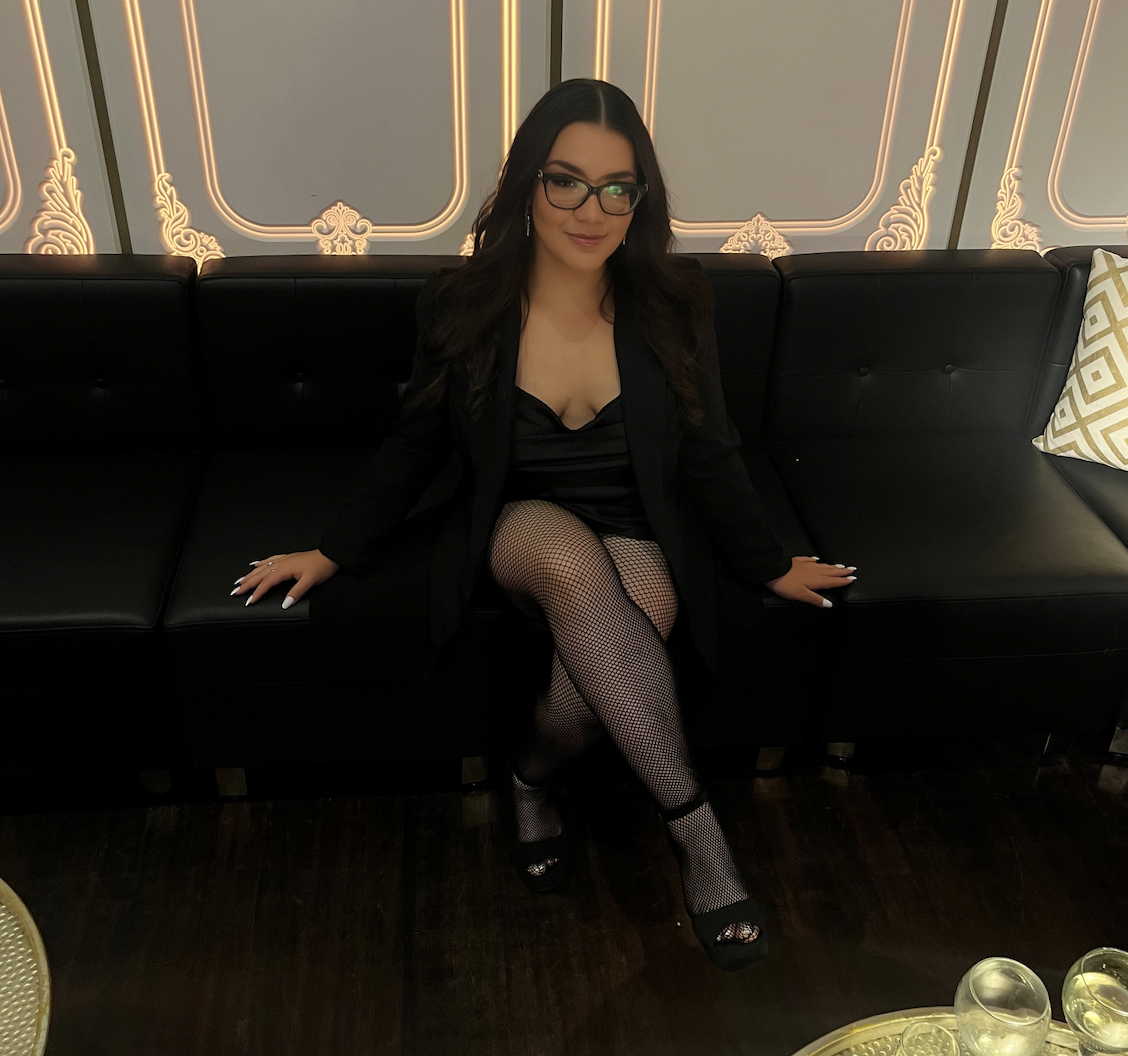
Writer | Tweet me @brittanyskylerr


